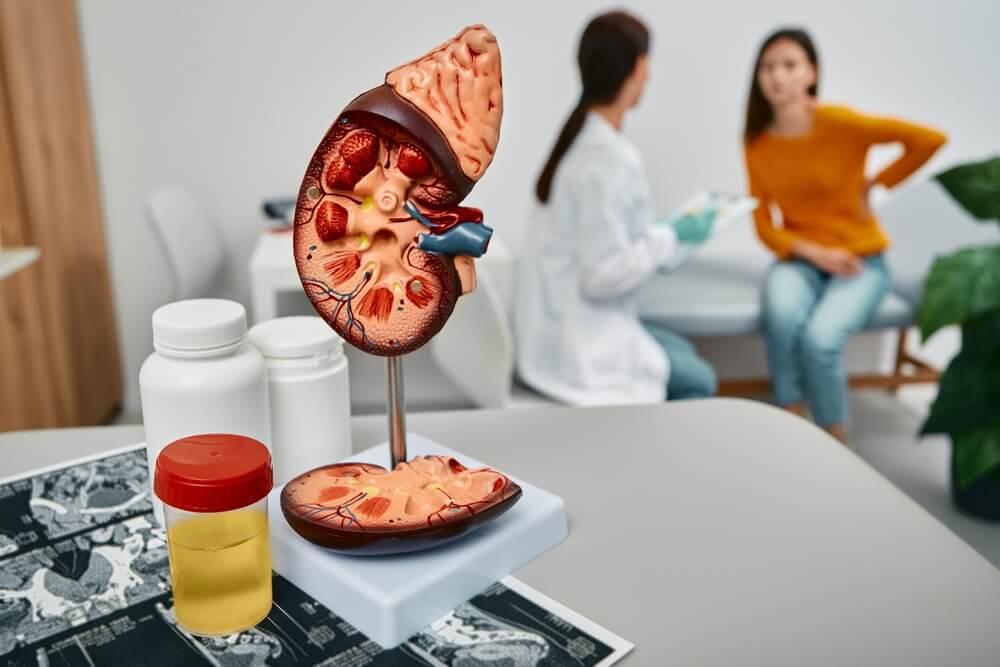Although the possibility of blood in urine may not always indicate a serious illness, in some instances, it can be hematuria. If you are new to this condition and you are looking for expert backed-up information to educate you, you have clicked on the right article. Below, you will find the most common (and rare) causes of blood in the urine, the usual symptoms, and what you can do about it.
Before starting this comprehensive article, make sure to book an appointment with a trained professional for evaluation. If you are looking for the best experts in the area, we recommend consulting with gynecology care specialists in South Miami, Florida.
So, if you notice blood after urinating and wiping and you feel concerned, this article will help ease your mind and hopefully answer your questions. Let us begin.
What is Hematuria?
Noticing blood in the urine can be scary, but in many cases, it is harmless. However, this alarming sign can also indicate a serious condition called hematuria.
There are two types of hematuria:
- Gross hematuria: You can see the blood.
- Microscopic hematuria: The urinary blood is only visible under the microscope.
There are various ways a professional can diagnose you for this condition. For instance, the health care provider can diagnose you with hematuria or its cause with:
- Urinalysis: The professional will test your urine in the doctor’s office via a dipstick. Alternatively, the urine sample will be sent to the laboratory for further analysis. If you are a woman, the doctor may ask when you had your last menstrual cycle. Namely, in some cases, the menstrual period may get into the urine sample and produce false-positive results for hematuria.
- A physical exam: During the physical exam, the expert will usually tap on your back and abdomen to check for any tenderness or pain in your kidney and bladder area. Moreover, the professional might suggest a digital rectal exam (if you are a man) to check for prostate issues. Women, on the other hand, may undergo a pelvic exam.
- A medical history: Your healthcare provider will take your medical history, review the symptoms, and check any over-the-counter medications and prescriptions. You will also be asked about your present and past medical condition.
- Added testing procedures: If you notice blood after urinating and wiping, you may need to undergo additional tests such as a blood test, a computed tomography (CT) scan, kidney biopsy, cystoscopy, and magnetic resonance imaging (MRI).
Always talk to your healthcare provider about the possible options. If you are looking for fast, expert results, reach out to OB-GYN Specialists of South Miami.

What are the Symptoms of Hematuria?
Patients with gross hematuria will see brown, red, or pink urine. Even a tiny amount of blood in the patient’s urine will cause discoloration of the urine. Usually, individuals with gross hematuria will not display other symptoms and signs of the condition. However, in some cases, hematuria patients with blood clots in their urine may experience back and bladder pain.
Your doctor will check whether you have RBC in the urine. In some cases, a higher than normal amount of red blood cells (RBCs) in your urine may indicate urinary tract, kidney, or bladder cancer. It may also be linked with urinary tract and kidney issues such as stones or infection. Some patients with high RBC in the urine may also be diagnosed with kidney injury, inflammation, or prostate complications.
That said, it is important to know the normal value. According to the facts, RBC in the urine results that are considered normal includes four red blood cells per HPF or high power field (or less when the urine sample is analyzed under the microscope).
What Causes Blood in Urine?
There are various causes for this serious medical condition. Here are some of the most common reasons why you may notice blood in your urine:
- Trauma
- Menstruation
- Sexual activity
- Infection in the prostate, kidney, or the bladder
- Vigorous exercise
- Viral diseases like hepatitis (a virus that can cause inflammation and liver disease)
- Endometriosis (a condition that affects women)
If you suspect you may have hematuria, reach out to your healthcare provider immediately. Some of the more serious reasons individuals may see blood in the urine include:
- Kidney or bladder cancer
- Blood-clotting conditions such as hemophilia
- Polycystic kidney disease
- Kidney inflammation, or inflammation of the prostate, bladder, or urethra
- Sickle cell disease
In most cases, what causes blood in the urine? Below, you will find some of the most common causes of this condition and brief descriptions:
- Kidney infections: Pyelonephritis or a kidney infection occurs when harmful bacteria enter the kidneys from the bloodstream or move from the ureters to the kidney(s). Patients with kidney infections will experience similar symptoms to bladder infections.
- Urinary tract infections: When harmful bacteria enter the body via the urethra and multiply in the bladder, you will likely experience a urinary tract infection. Symptoms include burning and pain when urinating, an increased urge to urinate, and potent-smelling urine.
- Kidney or bladder stone: These stones are typically painless, so patients usually do not know they have them unless they experience pain when being passed or when they cause blockage.
- Kidney disease: Microscopic urinary bleeding is a common symptom of kidney filtering system inflammation or glomerulonephritis.
- Enlarged prostate: Symptoms and signs of an enlarged prostate (BPH or benign prostatic hyperplasia) may include microscopic or visible blood in the urine, increased urge to urinate, and having issues urinating.
- Cancer: Blood in the patient’s urine can also indicate prostate, bladder, or kidney cancer. Luckily, if diagnosed in their early stages, these cancers can be treated.
- Medications: Penicillin and cyclophosphamide (an anti-cancer drug) can lead to urine in the blood. The blood thinner heparin and aspirin can also cause visible blood in the urine.
- Strenuous exercise: Although working out rarely causes hematuria, it is possible. Patients who experience bladder trauma, strenuous aerobic exercise, and dehydration may notice blood in the urine.
In some cases, you may notice blood, and it is not hematuria. For instance, if you:
- Have recently consumed beetroot, you may notice pink pee.
- Are bleeding from your anus.
- If you recently changed your medicine (some drugs can turn your urine brown or pink).
- Are on your menstrual cycle.
Blood in Urine and the Risk Factors
Nearly anyone, even children and teenagers, can have RBC in their urine. However, certain factors increase your risk of hematuria. Here are some of the most common risk factors:
- Recent infection: Patients may have kidney inflammation after a bacterial or a viral infection.
- Family history: Patients who have a family history of kidney stones or kidney disease are more likely to experience urinary bleeding.
- Age: Men above the age of 50 are more likely to experience hematuria due to having an abnormal-sized prostate gland.
- Strenuous exercise: Patients who do long-distance running are more prone to hematuria. In this case, the condition is referred to as “jogger’s hematuria.” Of course, anyone who works out vigorously may have symptoms of this condition.
- Certain medications: As mentioned, some medications such as antibiotics, pain relievers, and blood thinners may put you at higher risk of having blood in the urine.
Possible Treatment for Hematuria
Treating the underlying cause of hematuria is the best way to treat this serious medical condition. If the individual’s hematuria does not cause the blood in the urine, the patient may not need additional treatment. Overall, a well-balanced diet will help patients prevent and treat hematuria. However, as mentioned, the cause of the condition will determine the treatment you will receive. For example, patients who are experiencing urinary blood due to an infection such as a UTI will be prescribed antibiotics for the infection-causing bacteria.
Patients with hematuria due to kidney stones may require prescription medications and added treatments to assist with passing the stones. The healthcare provider may also suggest using extracorporeal shock wave lithotripsy or ESWL to break up the kidney stones. This procedure typically lasts an hour, and the patients may receive light anesthesia.
An alternative to removing kidney stones is a scope. The healthcare professional will pass a ureteroscope through the patient’s urethra and bladder into the ureter. With the help of special tools, the expert will snare the kidney stones and remove them. If these stones are abnormally large, they will need to be broken into pieces first.
Patients with an enlarged prostate will be prescribed medication such as 5-alpha reductase inhibitors or alpha-blockers. In rare cases, patients with enlarged prostates may require surgery.
The good news is that preventing hematuria is possible. Of course, you will need to address the underlying causes first. Here are some lifestyle changes you can implement today to prevent this medical condition:
- Consume plenty of water to stay hydrated and prevent stones.
- Avoid certain foods such as rhubarb and spinach, and avoid excess salt.
- Prevent infections by urinating immediately after having sex.
- Prevent infections by practicing proper hygiene.
- Prevent bladder cancer by stopping smoking.
- Limit your exposure to harmful chemicals.

FAQ
Should I feel concerned if I see blood after urinating and wiping?
Sometimes, women may mistake urinary blood for a menstrual period. However, if you notice blood in your urine, it is best not to disregard the signs and symptoms. In some instances, blood may not always indicate a severe medical condition. Always talk to a healthcare professional for expert advice and guidance.
Moreover, if you notice blood when wiping, you may have rectal bleeding. Patients with hemorrhoids, polyps, rectal or colon cancer, gastroenteritis, sexually transmitted infections, anal fissures, fistulas, and diverticulitis can experience rectal bleeding too.
How can I prepare for my doctor’s appointment?
Firstly, you will need to book an appointment with your healthcare provider. Alternatively, your doctor will refer you to a urologist or an expert specializing in urinary tract disorders.
We recommend making a list of the following things:
- Your medical information, such as your present and past medical conditions and whether diseases linked to the kidney or bladder run in the family.
- The symptoms you are experiencing such as abdominal pain.
- All supplements, vitamins, and medications you are currently taking, and the doses.
- Any questions you may want to ask your doctor.
Some questions you may want to ask the expert include:
- What tests will I need to do?
- What are the possible treatments available for me?
- I have other issues with my health. What is the best way to manage these issues together?
- Is my medical condition temporary?
- What could be the possible cause or causes of the symptoms?
- Where can I get more information about my condition (such as websites, printed materials, etc.)?
When should I get help?
We recommend talking to a professional as soon as you notice unusual bleeding or pain. By getting diagnosed and treated on time, you will increase your chances of recovery.
Book an Appointment Today
Don’t hesitate! Give us a call today and schedule an appointment with the best professionals in your area.


